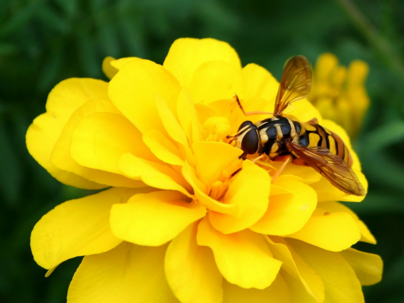Bees are essential little insects. You might already know about their role in pollinating the plants we depend on for sustenance. Without their diligent work, much of the food supply would collapse. However, these stinging insects can also pose risks, especially if you are allergic to their stings. It is not unusual for hives to lead to stinging incidents in the area; while most species are docile, they may become defensive if they perceive you as a threat to their colony.
Reliable bee control in Phoenix can help support these busy pollinators while minimizing potential dangers. In this article, Overson Pest Control will show you where to look for possible nesting sites and explain why they can be problematic. We will also show you how to deter bees and what to do should they start to settle on your property.
Identify Potential Nesting Sites: Where Bees Like To Build
Generally, most types of bees will seek spots that provide safety and protection from the elements and are close to food sources. Natural cavities like hollow trees or abandoned animal burrows are prime choices for them. Still, they can also take over artificial structures like your attic and wall voids, as they tend to be secluded and insulated. Some, like bumble bees, prefer nesting underground.
Learning which habitats bees prefer benefits beekeepers, who must provide their colonies with artificial hive boxes that mimic natural cavities. There, bees will enjoy a safe space to build their combs and rear their young. But while enticing bees to remain on your property is necessary if it is part of your job or a hobby, things are a lot different if you're a homeowner trying to enjoy your yard without all the problems an infestation can cause.
Why Bees In The Yard Can Be A Problem
Are bees in your yard? If so, here are some of the problems they can bring you must be aware of:
- They can make your property unsafe. Bees are generally beneficial. Still, it's easy to see how their presence can pose safety risks. Getting too close to their nests can lead to stings and the discomfort they bring.
- Nests can damage your home. Bees establish nests anywhere convenient, even in undesirable locations like wall voids or attics. The hive will grow over time and cause additional problems.
- You might worry about being outside. Being outdoors while bees are out in force can be unpleasant, not to mention dangerous. You might think twice about hosting events or spending time in the yard.
Don't let bees take away from your enjoyment of your property. Read on to learn how to control honey bees on your property.
Is There A Way To Deter Bees?
Yes, deterring bees is possible. Here are some strategies:
- Ask us about natural repellents: Essential oils and plants could help deter bees when used with professional bee control. Try planting mint or eucalyptus around your yard or spraying their oils around the perimeter of your home.
- Remove food sources: Flowering plants full of nectar and pollen are magnets for bees. Reducing their numbers right next to your home could make all the difference. Or, opt for non-flowering plants that are less attractive to these stinging insects.
- Seal nesting sites: Look for tree cavities, wall voids, and other areas where bees could build nests. Close them off to keep bee colonies at bay.
Bees are resourceful. If they still build nests despite your best efforts, give us a call to learn how to deter them safely.
The Best Call To Make About Bees In Your Yard
If you're dealing with bees in your yard, Overson Pest Control can help. With our expertise, an inspection is not typically required, allowing us to address your bee concerns swiftly. Our bee pest control products are tough on stinging insects while remaining safe for your home and property and will give you the results you want and deserve.
Our comprehensive services include the removal of any hives that may pose a threat, and our services come with a 30-day warranty.
Call the Overson Pest Control experts today for everything from bee hive removal services to prevention. Soon, you will regain control of your yard and enjoy gatherings free of stinging insects any time of year.

